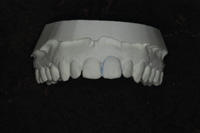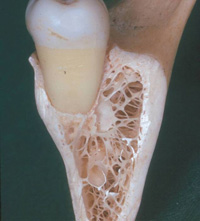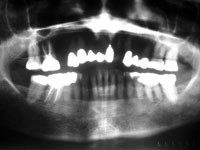If you’re wondering what “defalcated” means, you may be lucky. Defalcation, according to Webster’s Dictionary, is “to steal; misuse funds entrusted to one’s care; embezzlement.” My trusted bookkeeper managed numbers in our accounting department, but also managed to be “self-employed,” embezzling more than $25,000 during her 4-year tenure. We hired a private investigator, Nick, who, after assessing my situation, asked me, “Hey Doc, have you ever been defalcated before?” When I didn’t answer right away, he took the liberty to explain its meaning.
I have been a dentist for more than 30 years, and on 3 separate occasions I have been defalcated. I am not aware of statistics related to how often a dentist in private practice can expect to have a theft against him or her. I am also not referring to the taking of stamps, pens, toothbrushes, etc. That is the price of doing business. I am referring to money disappearing and its ramifications. I also hope that there haven’t been other incidents in my practice that I am not aware of!
THE FIRST DEFALCATION
 |
|
Illustration by Brian C. Green
|
The first incident took place in 1978. I was a young dentist who had become a partner with an older dentist with 5 employees. We were not computerized and had just hired a new receptionist. I received a telephone call from a colleague in my town who heard that we had just hired a new receptionist, Ms. X. My colleague advised me that he had just terminated Ms. X because she had stolen some monies from his office. Ms. X had threatened my colleague with legal action if he told anyone the reasons for her dismissal. She had denied all accusations, and she was not arrested, just terminated immediately.
About a year and a half later I met another colleague at a dental meeting, and he mentioned he had hired Ms. X. I told him about my experience with her and shared the information provided from her previous employer. His mouth literally dropped open. He told me that he suspected some monies were missing from his office. He subsequently brought his accountant in to check his records and found $9,000 missing. My colleague pressed charges, and Ms. X was found guilty on several counts.
THE SECOND DEFALCATION
This article began with a reference to the story I am about to tell. In February 1998, my next known defalcation occurred. My practice now had 3 full-time dentists and approximately 20 additional employees. At this time we were computerized. A dental assistant approached my partner and stated that her W-2 form was incorrect. The W-2 form had income totaling $8,000 more than she had actually made. Another employee came forward with a similar W-2 story. My partner and I spoke with our accountant and lawyer, and they proposed we question our bookkeeper, Ms. Y, about these W-2 irregularities. When we did, she became very agitated and didn’t have any answers. We suggested Ms. Y visit our accountant’s office, and together they would go over the records. She didn’t show up for that appointment, and she subsequently called out sick.
We then hired the private investigator, Nick, who worked with our accountant and attorney to uncover the full extent of our losses. The investigation uncovered Ms. Y’s scheme. Our office util-izes a payroll service for our bimonthly payroll. These are the only checks in our office that are preprinted with our signatures. On occasion, Ms. Y would have the payroll service issue additional paychecks for 2 employees, give them each their correct checks, and then cash the other checks. Ms. Y would forge their names and go to our local bank, where she would cash the employees’ extra checks.
The investigation revealed Ms. Y had been forging and cashing these additional payroll checks for 2 years, totaling approximately $21,000. In addition, she was padding the petty cash receipts with personal receipts and pocketing these additional monies. Ms. Y had been our bookkeeper for 4 years, and I personally had entrusted her with almost anything. She was eventually prosecuted and pled guilty to 4 felony counts: theft by deception, theft by unlawful taking, receiving stolen property, and forgery. She was sentenced to 5 years probation and ordered to pay restitution.
THE THIRD (AND HOPEFULLY LAST) DEFALCATION
RECOMMENDATIONS
(1) Always try to have several individuals handle the cash payments, make entries, formulate bank deposits, check day sheets, and make the bank deposits. The receptionist can take the payments and make computer entries; the doctor can check the day sheet and/or computer sheet and deposit; and the bookkeeper or office manager can do the bank deposit. By having more than one person take care of the cash, it is more difficult for one person to embezzle funds.
(2) The doctor should open the mail when possible. It gives the doctor a sense of what monies are coming into the office on a regular basis. In addition, the employees perceive the doctor as the chief financial officer of the practice.
(3) Always get referrals on new employees from past employers.
(4) Do background or criminal checks on all prospective employees.
(5) Check the audit trail on a regular basis on your computer to make sure deposit changes haven’t taken place. Our office software is Dentrix, which has an audit trail, as do many other computer software systems. If you are not sure about your system, check with your software supplier.
(6) If you use a payroll company to process paychecks, ask for a copy or a summary of all checks they issue…and check it!
(7) Watch petty cash to see if proper receipts are being recorded.
(8) If an employee never takes time off, it can sometimes mean he or she doesn’t want
to leave and/or possibly expose an area of deceit.
(9) Trusting employees is very important. The overwhelming majority of your employees are honest, hardworking people.
CONCLUSION
I am a good employer, fair and equitable to my staff. So why would someone want to steal from me? There are those who have entitlement issues. They see a good deal of money coming into a dental office. The doctor lives in a nice home, drives a nice car, and goes on vacations. Why shouldn’t they have a little bigger piece of the pie? Some employees may be in a dire situation and may need money for some problem. Am I an exception to the average, having had 3 documented defalcations? Probably not. Am I average? Maybe. If you’ve been in private practice for many years and never have been defalcated, consider yourself very lucky.
Dr. Hopenwasser has been a practicing dentist for more than 30 years and has lectured extensively on dental management. His practice management articles have been published in Dental Economics, Dental Management, Dentistry Today, and the Journal of the American Dental Association, and he has also written a chapter in the book Success Guide for New Dentists, published in 1990 by Anadem Publishing in Columbus, Ohio. He can be reached at (215) 493-4021 or howarddmd@aol.com.











